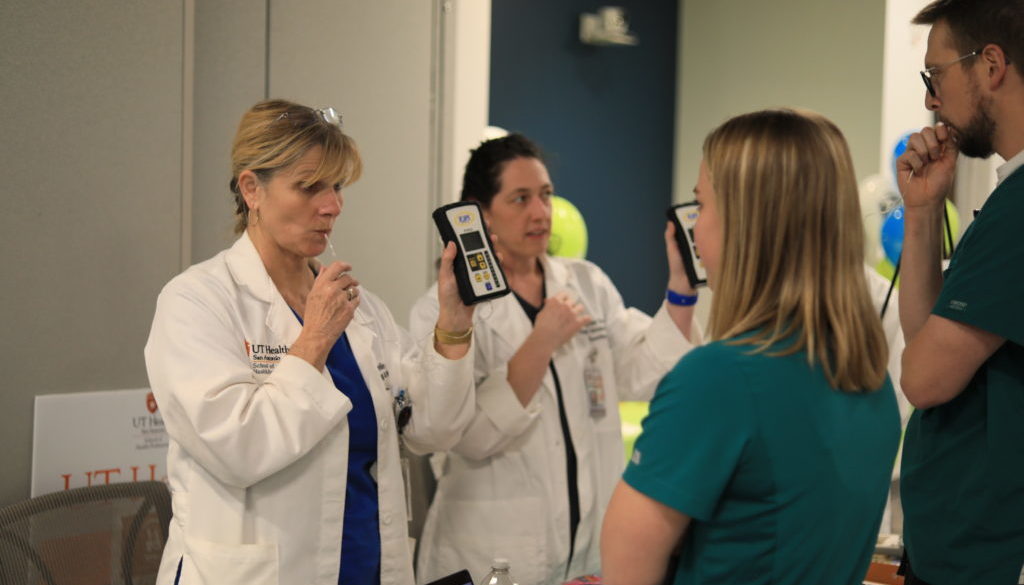Last week, Peterson Health invited the community to attend their “Parkinson’s Palooza” event for a plethora of local resources and to raise awareness of the neurodegenerative disorder. The event was thrown in celebration of Peterson’s Parkinson’s Support Group’s tenth anniversary.
“We have a lot of community partners and resources that want to come and speak to our group, but we only have 12 months in a year. So we brought around 25 vendors together so that our community members who have Parkinson’s, and their loved ones, could get as much information and resources at their fingertips as possible,” said Devin Sebek, an occupational therapist at Peterson.
Since Parkinson’s is a neurodegenerative disease that affects the nervous system, vendors such as movement therapies, speech-language pathologists, and representatives from Peterson’s own programs and support groups were invited to share resources with the public.
“Most of the vendors are local, with a couple from San Antonio since we don’t have movement disorder specialists here. With Peterson being a rural hospital, we want to make sure we can provide comprehensive care so patients are not having to travel far,” said Sebek.
Representing UT Health at San Antonio with information revolving around the relationship between dysphagia and Parkinson’s was Dr. Giselle Carnaby and her array of interactive tests and tools.
“Swallowing difficulties in Parkinson’s starts really early, almost in the prodromal phase. So before they even know they have a problem, they stop swallowing as often – before they even have a tremor. We’re here showing people different ways that we work with Parkinson’s patients to improve and strengthen that swallowing system,” said Dr. Carnaby.
Demonstrating how lip and tongue strength is measured, Dr. Carnaby used an IOPI (Iowa Oral Performance Instrument), a device with an external tube and rubber bulb that patients press to the roof of their mouths with their tongue.
“Parkinson’s patients often think they are swallowing fine, but they aren’t – so we have to train them. The IOPI is part of the step towards teaching people to swallow harder. So we get them to have a go at this, do it several times, and then we’ll integrate it into a swallowing action. Then we’ll add it to a functional task, something like swallowing a marshmallow,” said Dr. Carnaby.
Creating movement-based routines is common among programs for Parkinson’s patients. Peterson Health offers programs for every phase of a patient’s Parkinson’s journey, with follow-up programs and support groups available after completing occupational, physical, and speech therapies.
“We have our Big and Loud programs, each are separate but work together to strengthen Parkinson’s patient’s speech and movements. The Loud program focuses on really projecting the voice, being able to understand what people say, and articulation. The Big program is movement-based therapy that strengthens the movements of getting dressed, opening doors, getting in and out of bed and chairs – things like that,” said Certified Occupational Therapy Assistant, Colby Medran.
The Parkinson’s Palooza also featured vendors aimed at supporting patients and their loved ones beyond therapy options alone. Representing the Texas Long-Term Care Ombudsman Program was outreach specialist, Sherri Smith.
”As a long-term ombudsman, we protect resident rights for those that live in assisted living facilities and nursing homes. We also answer questions regarding long-term care for the public. Everything we offer is free of charge,” said Smith.
The Long-Term Care Ombudsman program works with both residents and their families to protect the quality of life of long-term care residents.
“We are here making the community aware that they have an advocate to help them. We actually are unique, in the ombudsman world, in that we’re not mediators – we get to take the residents’ side and help address concerns,” said Smith.
The first annual Parkinson’s Palooza saw a steady stream of guests during its two-hour duration, and introduced many community members to resources available in and around their area.
Peterson Health’s Parkinson’s Support Group is held on the first Wednesday of every month from 4-5 p.m. at Conference Room 2 in the Hospice and Home Care Building located at 250 Cully Drive in Kerrville.
For more information, call (830) 258-7960.
